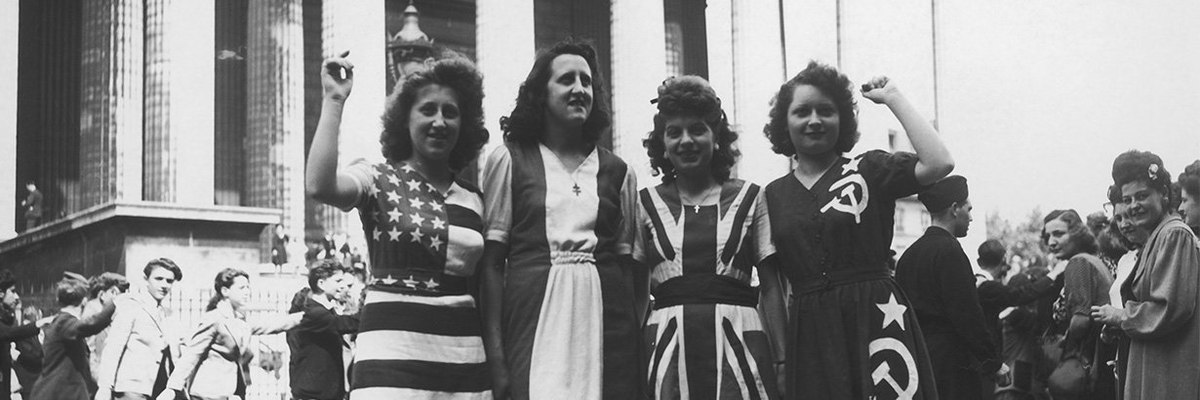This week sees the 80th anniversary of VE Day, marking the end of World War 2 in Europe. To mark the occasion, a new YouGov survey examines European (British, French, German, Italian and Spanish) and American attitudes towards World War 2, with an accompanying study looking at expectations for future conflicts.
How much do people know about World War 2, and do they see the conflict as still relevant?
Self-assessed knowledge of World War 2 varies across the countries, with French people (72%) and Germans (70%) the most likely to say they know a great deal or fair amount about the conflict. Spaniards are the least likely to say so, at 40% - Spain is the only country surveyed that did not participate in the war.
Most Americans (59%) and two thirds of Britons (66%) say they know a great deal or fair amount about World War 2.
There is likewise variation in the level of teaching about the war. While three quarters of French people (77%) say they were taught a great deal or fair amount about the conflict in school this compares to 60% of Germans, and falls to only 34% among Spaniards. Typically, the younger generations in each country are more likely to report having been taught a lot about the conflict than their elders.
When it comes to continuing to teach about the conflict, the overwhelming majority of Europeans and Americans believe that it is and that it is important for this period of history to be taught in schools (82-90%), and indeed large numbers (72-87%) believe that the events of World War 2 and the years leading up to it are still relevant to the world today.
It could happen here? Many see a repeat of Nazi crimes as possible during their lifetime
With World War 2 seeing some of the worst crimes against humanity ever committed, many people across the countries we surveyed are alive to the possibility that they could see their repeat. Between 31% and 52% believe it is possible that, during their lifetimes, “crimes like those committed by the Nazi regime in Germany in the 1930s and 40s” could happen in their own country.
When it comes to those crimes being repeated in Germany specifically, this figure is typically similar, at 34-47%, including 44% among Germans themselves. For the more generic expectation that Nazi-style crimes could be committed in “another Western European country”, a higher rate of 44-59% see such circumstances as possible.
In 1935, a novel by Sinclair Lewis – famously entitled “It Can’t Happen Here” – warned against complacency against fascism, portraying the rise of a fascist dictatorship in the USA. Our survey shows that Europeans are similarly open to the possibility that Nazi-style crimes could be committed in America, with 44-60% saying so, including 52% of Americans.
What might respondents be thinking when they say that “crimes like those committed by the Nazi regime in Germany in the 1930s and 40s” could take place? To offer a little more insight into that point, we ran a follow up study in Britain asking about more specific crimes.
The results show that 42% of Britons think it is possible that a fascist dictatorship could seize power in Britain – a figure which roughly mirrors the 43% who said the “crimes of the Nazis” could be repeated in Britain. Fewer Britons see it as a possibility that Britain might invade its neighbours (19%), intern social groups in camps (26%) or exterminate them (15%).
However, on this variation of the question, respondents are more likely to see some specific crimes as possible in other countries than they were in the generic question. This notably applies to a non-specific ‘Western European country’ and also the USA, the latter of which 66% of Britons think could be taken over by a fascist regime, 73% think could invade its neighbours, and 38% see as potentially committing genocide against social groups.
Who did the most to defeat the Nazis?
In 1945, French pollster IFOP asked the French populace which country they thought had done the most to defeat the Nazis. At that time, the Soviet Union was by far the most common answer, with 57% saying so compared to only 20% for the USA and 12% for the UK.
Attitudes have shifted significantly in the following eight decades, with only 17-28% of Europeans and Americans today suggesting that the USSR did the bulk of the work in bringing down Hitler. The more common view is now that the Americans were the primary reason for the Nazi defeat, with 40-52% in each country saying so.
The exceptions are the British, where people are most likely to think the UK did the most to assure victory in Europe: 41% of Britons say so, compared to only 14-17% who think the Americans or Soviets play the greatest role. Just 5-11% of Americans and Europeans share this Anglo-centric opinion.
Was the bombing of Germany morally justified?
One of the more controversial aspects of the Allied advance through Europe was the strategic bombing campaign against Germany, which saw hundreds of thousands of civilian casualties and devastated cities like Hamburg and Dresden. For these reasons, it was not until 2012 that a memorial for those who served with Bomber Command was erected in Britain.
Nevertheless, most Britons and Americans (56%) consider the bombing campaign to be morally justified. Germans disagree, with only 23% considering the attacks justifiable, compared to 50% who do not.
The type of ordnance involved clearly has an impact on opinion: when we asked about the morality of dropping atomic bombs on Hiroshima and Nagasaki in Japan, the figures dwindle considerably. Americans are divided, with 38% saying the attacks were justified but 35% disagreeing. Britons are 30 points less likely to think these attacks on Japanese cities were justified – at 26% – compared to the conventional raids on Germany, and the number of Germans seeing the atomic bombings as justifiable is just 6%.
Shame and atonement – what do Europeans and Americans make of the behaviour of former Axis countries since the war?
Unsurprisingly, a large majority of Britons (84%) and Americans (74%) think it was right for their countries to participate in World War 2, as do 62% of French people. Only 3-9% think it was wrong to take part.
By contrast, only 8% of Germans and 18% of Italians think it was right for their own countries to participate in the conflict – Italy notably fought as both an Axis and Allied country during the war. Most Germans (70%) and Italians (56%) say their countries were wrong to take part in the war.
Half of Germans (50%) and four in ten Italians (41%) say they are ashamed of their country’s role in World War 2, with most of the rest saying they are neither proud nor ashamed (40-42%).
But how do Europeans and Americans think former Axis nations have done in rehabilitating themselves following the conflict?
Approaching half of Germans (46%) think their country has done a good job of dealing with their actions during WW2 – a stance which 49% of Americans and 58% of Britons are inclined to agree with.
French people and Italians – both occupied by the Germans during the conflict – are more circumspect, with only 34% and 30% respectively saying the Germans have done a good job making amends. Indeed, around a quarter in both countries (24-26%) think Germany has done a bad job at dealing with its actions during the war.
Italians are more divided on their national approach since the war, with 30% saying Italy has done a good job, 31% neither a good nor bad job, and 22% a bad job. Other countries are relatively similarly split on Italy.
Our surveyed nations are more likely to think that Japan has done a good job than Italy at dealing with its actions since World War 2. This is perhaps ironic, as there is a long-running list of unaddressed disputes regarding Japanese actions during the war, including on the issue of sexual slavery and politicians visiting shrines that commemorate war dead that include Class A war criminals.
Germany has faced criticism in the years following the conflict that it has allowed consciousness of its previous crimes to overly impact its contemporary foreign policy decisions, most notably regarding Israel, towards which it sees itself as having a “special responsibility”.
However, almost half of the German public (47%) now believe that “Germany has been overly conscious of its Nazi past, and this has prevented it from taking strong enough actions/stances on more recent problems”. Only 24% of Germans think their leaders have been getting the balance right, while 13% think the country has not been conscious enough about their Nazi past.
Other countries are more divided on this topic – between 20-31% agree that Germany has acted with too much of an eye to their actions in the 1930s and 40s, while 31-34% think they have got the balance about right.
Peace in our time – who do Europeans and Americans see as having kept the peace on the continent in the post-war years?
The end of World War 2 saw the formation of the United Nations in order to try and ensure global peace from that point on.
At least a plurality of Europeans and Americans credit the UN with contributing a “great deal” or “fair amount” to preserving peace in Europe in the post-war period, ranging from 44% in Germany to 60% in France.
But it is NATO that is the most likely to be seen as having prevented the outbreak of another war, with 52-66% of Europeans and Americans giving the military alliance credit for keeping the peace.
The latecoming European Union was also established with continental peace being one of its main goals, the efforts for which it would win the Nobel Peace Prize in 2012. Between 45% and 56% of Europeans and Americans likewise believe the EU has been a major contributor to a conflict-free continent in the post-war period.
What do you think about the relevance of World War 2 today, the chances that the crimes of the Nazis will be repeated, and everything else? Have your say, join the YouGov panel, and get paid to share your thoughts. Sign up here
Photo: Getty







